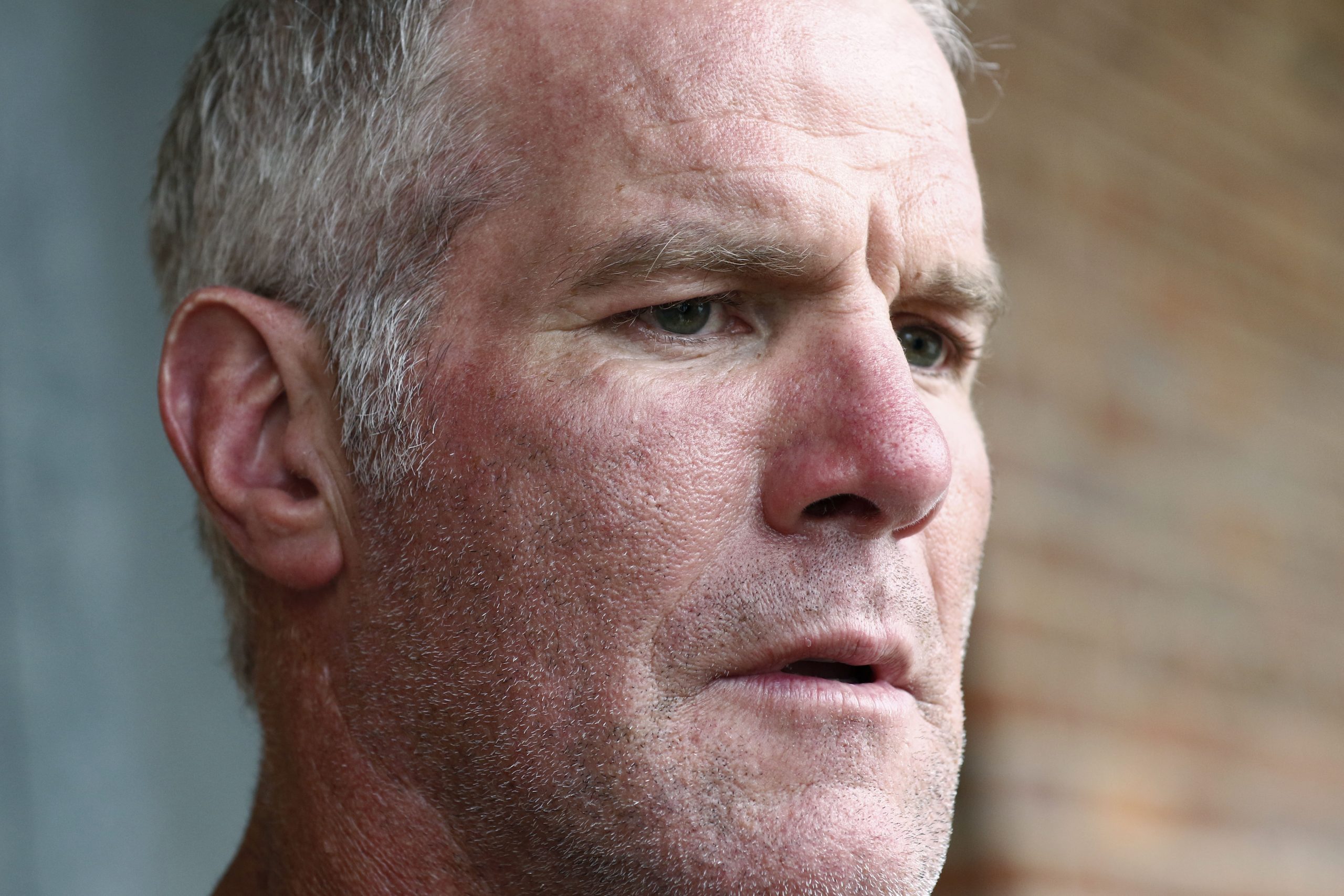Mississippi Today
Brett Favre interrogated in Hattiesburg about welfare funding

Attorneys interrogated former NFL quarterback Brett Favre about his involvement in the Mississippi welfare scandal for about eight hours Monday.
The questions centered on how Favre lobbied welfare officials for federal grant funds to support the construction of a volleyball stadium at University of Southern Mississippi and a pharmaceutical startup company in which the athlete was investing.
The scheduled deposition, which happened in Hattiesburg, relates to the ongoing civil lawsuit, not criminal proceedings. Favre is one of 47 defendants in a civil case that the Mississippi Department of Human Services, the state’s safety net agency, filed in an attempt to recoup $77 million in misspent or stolen welfare funds.
Much of the state’s case rests on text messages between officials and Favre, which lawyers say demonstrate that Favre knew the funds were supposed to serve the needy and that there were federal restrictions for using the money to erect buildings. Favre also personally received $1.1 million from the public agency, which officials funneled through two payments from a private nonprofit in 2017 and 2018, to cut radio ads for the state’s anti-poverty initiative.
“Will the public perception be that I became a spokesperson for various state funded shelters, schools, homes etc….. And was compensated with state money? Or can we keep this confidential,” Favre texted the nonprofit operator, Nancy New, who channeled the funds to Favre’s projects.
Favre has since returned the $1.1 million. In the past, Favre has argued it’s unreasonable that he would have known such a deal was illegal or unethical since multiple lawyers, state employees and public officials – all the way up to former Gov. Phil Bryant – were on board with it. New alleged in a 2022 court filing that Bryant directed her to pay the money to Favre. Bryant has denied any involvement in the deals to use welfare money for Favre’s volleyball or pharmaceutical projects.
“The agreement (that funded the volleyball stadium) was reviewed and approved by the Attorney General, who recommended that the IHL Board of Trustees approve it, which they did,” reads Favre’s unsuccessful motion to dismiss the civil suit. “The IHL Board of Trustees expressly noted that MCEC’s funding was via a block grant from MDHS. The Governor was aware of the source of the funding and supported it. Following final approval, Southern Miss publicly announced the plans for the State-owned Wellness Center and lauded MCEC’s support for the project. Not one public Mississippi official or lawyer expressed any objection to or concern about the funding and plan.”
While the state has held some people accountable for the expenditure — New’s son Zach New, for instance, pleaded guilty to a felony fraud charge related to the expenditure and the civil suit targets two lawyers, Jacob Black and Garrig Shields, for their involvement — Bryant has not faced any civil or criminal charges.
Bryant heavily touted the initiative, called Families First for Mississippi, that welfare officials used to justify most of the purchases that auditors and attorneys are now scrutinizing. New and the former welfare director Bryant appointed, John Davis, have pleaded guilty to several state and federal charges and are awaiting what could be years-long prison sentences.
This article first appeared on Mississippi Today and is republished here under a Creative Commons license.
Mississippi Today
An ad supporting Jenifer Branning finds imaginary liberals on the Mississippi Supreme Court

The Improve Mississippi PAC claims in advertising that the state Supreme Court “is in danger of being dominated by liberal justices” unless Jenifer Branning is elected in Tuesday’s runoff.
Improve Mississippi made the almost laughable claim in both radio commercials and mailers that were sent to homes in the court’s central district, where a runoff election will be held on Tuesday.
Improve Mississippi is an independent, third party political action committee created to aid state Sen. Jenifer Branning of Neshoba County in her efforts to defeat longtime Central District Supreme Court Justice Jim Kitchens of Copiah County.
The PAC should receive an award or at least be considered for an honor for best fiction writing.
At least seven current members of the nine-member Supreme Court would be shocked to know anyone considered them liberal.
It is telling that the ads do not offer any examples of “liberal” Supreme Court opinions issued by the current majority. It is even more telling that there have been no ads by Improve Mississippi or any other group citing the liberal dissenting opinions written or joined by Kitchens.
Granted, it is fair and likely accurate to point out that Branning is more conservative than Kitchens. After all, Branning is considered one of the more conservative members of a supermajority Republican Mississippi Senate.
As a member of the Senate, for example, she voted against removing the Confederate battle emblem from the Mississippi state flag, opposed Medicaid expansion and an equal pay bill for women.
And if she is elected to the state Supreme Court in Tuesday’s runoff election, she might be one of the panel’s more conservative members. But she will be surrounded by a Supreme Court bench full of conservatives.
A look at the history of the members of the Supreme Court might be helpful.
Chief Justice Michael Randolph originally was appointed to the court by Republican Gov. Haley Barbour, who is credited with leading the effort to make the Republican Party dominant in Mississippi. Before Randolph was appointed by Barbour, he served a stint on the National Coal Council — appointed to the post by President Ronald Reagan who is considered an icon in the conservative movement.
Justices James Maxwell, Dawn Beam, David Ishee and Kenneth Griffis were appointed by Republican Gov. Phil Bryant.
Only three members of the current court were not initially appointed to the Supreme Court by conservative Republican governors: Kitchens, Josiah Coleman and Robert Chamberlin. All three got their initial posts on the court by winning elections for full eight-year terms.
But Chamberlin, once a Republican state senator from Southaven, was appointed as a circuit court judge by Barbour before winning his Supreme Court post. And Coleman was endorsed in his election effort by both the Republican Party and by current Republican Gov. Tate Reeves, who also contributed to his campaign.
Only Kitchens earned a spot on the court without either being appointed by a Republican governor or being endorsed by the state Republican Party.
The ninth member of the court is Leslie King, who, like Kitchens, is viewed as not as conservative as the other seven justices. King, former chief judge on the Mississippi Court of Appeals, was originally appointed to the Supreme Court by Barbour, who to his credit made the appointment at least in part to ensure that a Black Mississippian remained on the nine-member court.
It should be noted that Beam was defeated on Nov. 5 by David Sullivan, a Gulf Coast municipal judge who has a local reputation for leaning conservative. Even if Sullivan is less conservative when he takes his new post in January, there still be six justices on the Supreme Court with strong conservative bonafides, not counting what happens in the Branning-Kitchens runoff.
Granted, Kitchens is next in line to serve as chief justice should Randolph, who has been on the court since 2004, step down. The longest tenured justice serves as the chief justice.
But to think that Kitchens as chief justice would be able to exert enough influence to force the other longtime conservative members of the court to start voting as liberals is even more fiction.
This article first appeared on Mississippi Today and is republished here under a Creative Commons license.![]()
Mississippi Today
On this day in 1968


Nov. 24, 1968

Black Panther leader Eldridge Cleaver fled the U.S. to avoid imprisonment on a parole violation. He wrote in “Soul on Ice”: “If a man like Malcolm X could change and repudiate racism, if I myself and other former Muslims can change, if young whites can change, then there is hope for America.”
The Arkansas native began to be incarcerated when he was still in junior high and soon read about Malcolm X. He began writing his own essays, drawing the praise of Norman Mailer and others. That work helped him win parole in 1966. His “Soul on Ice” memoir, written from Folsom state prison, described his journey from selling marijuana to following Malcolm X. The book he wrote became a seminal work in Black literature, and he became a national figure.
Cleaver soon joined the Black Panther Party, serving as the minister of information. After a Panther shootout with police that left him injured, one Panther dead and two officers wounded, he jumped bail and fled the U.S. In 1977, after an unsuccessful suicide attempt, he returned to the U.S. pleaded guilty to a reduced charge of assault and served 1,200 hours of community service.
From that point forward, “Mr. Cleaver metamorphosed into variously a born-again Christian, a follower of the Rev. Sun Myung Moon, a Mormon, a crack cocaine addict, a designer of men’s trousers featuring a codpiece and even, finally, a Republican,” The New York Times wrote in his 1998 obituary. His wife said he was suffering from mental illness and never recovered.
This article first appeared on Mississippi Today and is republished here under a Creative Commons license.![]()
Mississippi Today
On this day in 1867


Nov. 23, 1867

The Louisiana Constitutional Convention, composed of 49 White delegates and 49 Black delegates, met in New Orleans. The new constitution became the first in the state’s history to include a bill of rights.
The document gave property rights to married women, funded public education without segregated schools, provided full citizenship for Black Americans, and eliminated the Black Codes of 1865 and property qualifications for officeholders.
The voters ratified the constitution months later. Despite the document, prejudice and corruption continued to reign in Louisiana, and when Reconstruction ended, the constitution was replaced with one that helped restore the rule of white supremacy.
This article first appeared on Mississippi Today and is republished here under a Creative Commons license.![]()
-

 Kaiser Health News7 days ago
Kaiser Health News7 days agoA Closely Watched Trial Over Idaho’s Near-Total Abortion Ban Continues Tuesday
-

 Local News3 days ago
Local News3 days agoIntroducing our Student Athlete of the Week: Ocean Springs’ very own Mackenzie Smith
-

 Local News6 days ago
Local News6 days agoSherral’s Diner to be featured on America’s Best Restaurants
-

 News from the South - Georgia News Feed5 days ago
News from the South - Georgia News Feed5 days agoJose Ibarra found guilty in murder of Laken Riley | FOX 5 News
-

 News from the South - Alabama News Feed6 days ago
News from the South - Alabama News Feed6 days agoTrial underway for Sheila Agee, the mother accused in deadly Home Depot shooting
-

 News from the South - Kentucky News Feed5 days ago
News from the South - Kentucky News Feed5 days agoNicholasville organization activates weather plan in response to bitter cold temperatures
-

 News from the South - Alabama News Feed4 days ago
News from the South - Alabama News Feed4 days agoJudge grants mistrial in Sheila Agee trial due to ‘unhinged juror’
-

 News from the South - Alabama News Feed5 days ago
News from the South - Alabama News Feed5 days agoAlabama's weather forecast is getting colder, and a widespread frost and freeze is likely by the …



























